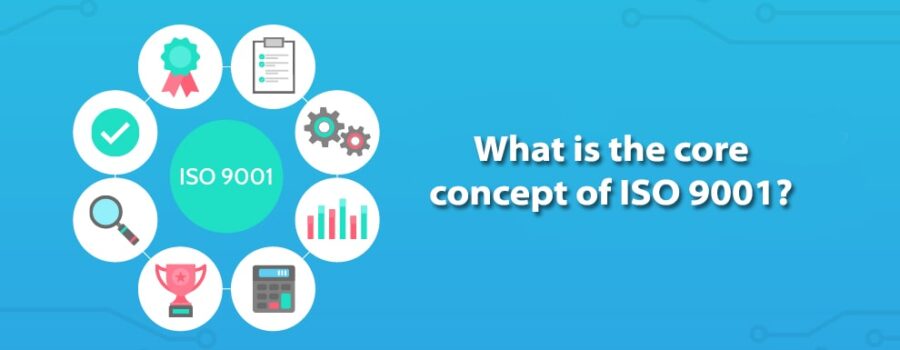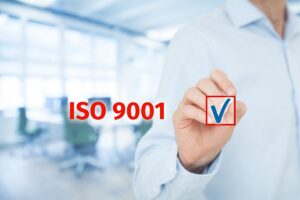ISO 9001 is defined as a proper system that documents processes, procedures, and responsibilities for achieving quality management system policies and objectives. It helps to assure that a service or a product meets the requirements or the customer’s expectations every time.
Core concepts of ISO 9001
-
- A core concept of ISO 9001 describes a management approach to long-term success through customer satisfaction. All members in an organization, ranging from top management to lower staff must participate in the improvement process, and in ensuring that customers receive quality products and services.
-
- It arrives at how risk is to be pointed in establishing the required processes. It defines the scope of process planning and controls. It Improves the effectiveness of the QMS. It also manages, monitors, and maintains the system. A quality management system ensures that an organization, product, or service is compatible. ISO 9001 has four main components: quality assurance, quality planning, quality control, and quality improvement.
-
- Quality is conformance to specifications. This simply means meeting the regulatory requirements and the customer needs. It increases customer satisfaction through the effective application of the system.
-
- Quality management ensures high-quality products and services are offered to customers by terminating defective products and improving on services including continuous changes and improvements to the system. This will in turn lead to loyal and satisfied customers who will refer other customers.
-
- Quality is critical to satisfying customers and retaining their loyalty so they continue to buy from you in the future. Providing quality products and services builds trust between you and the customer and it also makes an important contribution to long-term revenue and profit in your business.
Core Elements of ISO 9001 Quality Management
There are 9 Core Elements of ISO 9001 Quality Management Systems which are listed below:
1. Customer focus: Customers can be anyone! I:e an organization, or person(s). You need to focus on the product that you supply to your customer. When you give them quality products, you meet their expectations and satisfy their needs. You gain their trust and have a strong customer relationship with them.
2. Leadership: A leader plays a vital role in an organization’s QMS. Without the right leadership, the total quality management system cannot fully succeed.
3. Engagement of people: Engaging people at all levels in an organization is important to building its ability to create and deliver value to the success of stakeholders. Increase the involvement of the people in the improvement activities.
4. Process approach: A process is a couple of activities that are interrelated. Processes in an organization should be planned and carried out under controlled conditions. A process approach is a management strategy. A team leader uses a process approach to manage processes that make up the organization. The interactions between these processes including inputs and outputs link these processes.
5. Continuous improvement: This refers to an organization’s ability to continuously improve its processes, products, and services to meet quality requirements. Continuous improvement can be followed by conducting regular audits, analyzing the company’s data, setting certain objectives, and implementing corrective actions.
6. Evidence-based decision-making: Making a decision to implement a QMS based on ISO 9001 is advantageous, and the benefits are numerous and documented in the ISO 9001 standard. Effective decisions are taken based on the proper reports and information, in order to properly manage your QMS, you depend on good data rather than just assuming what needs to be done. Evidence is mandatory to make any kind of decision.
7. Relationship management: An organization needs to maintain a strong relationship with its customers. The quality and its product are always supported by the relationship that an organization maintains with its customers, suppliers, partners, and other stakeholders. This helps and provides feedback to you on improving your process which helps to improve your quality management system.
The core concept of ISO 9001 is providing quality products and services to guarantee customer satisfaction. Many organizations struggle with maintaining their quality management system to fit the requirements of ISO 9001. This is why the expertise of the ISO 9001 Auditor is critical. A company can decide to hire an internal auditor or train one or more of their employees to become their internal auditor(s); depending on the size of the company, or simply engage the expertise of a lead auditor. The role of the internal or external auditor is to audit the organization’s processes, operations, and data against the ISO 9001 Standards. The ISO 9001 Internal Auditor helps the organization maintain quality service. The Lead Auditor also plays an important role in ensuring that the organization meets ISO 9001 QMS legal requirements.
A Lead Auditor of the ISO 9001 is highly valued by organizations in various industries. Becoming an ISO 9001 will make you a value-adding, highly sought-after professional. This can set you on the right career path, and give you an authority in the industry. To become an ISO 9001 Lead Auditor, attend the ISO 9001 Lead Auditor training course in 3FOLD Training; an approved training partner of CQI IRCA – the largest and global certification body for management systems auditors.
3FOLD offers the CQI IRCA ISO 9001 Lead Auditor training course online. The training runs for 40 hours and is conveniently scheduled to accommodate everyone with the passion and desire to become an ISO 9001:2015 Lead Auditor. Enroll in our ISO 9001 Lead Auditor Training Program. You can reach us through the enquiry form, WhatsApp, or email.






Leave a Reply
Your email is safe with us.